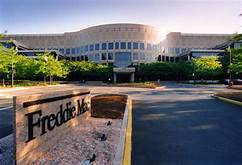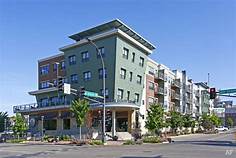OTHER NEWS
The Learning Center
Our Learning Center ensures that every reader has a resource that helps them establish and maintain a competitive advantage, or leadership position. For instance, loan originators and brokers will have one-click access to resources that will help them increase their productivity. Search topics by category and keyword and generate free videos, webinars, white papers and other resources. If you would like to add your content to the learning center, please click here or email Tim Murphy at [email protected].

matt
Freddie, Aon Unveil $915M Multifamily Risk Transfer Offering
- Friday, 04 January 2019

Freddie Mac has completed its first its multifamily credit risk transfer offering on a pool of $915 million, working with Aon, a reinsurance broker.
Freddie Mac has purchased credit risk insurance for the first 5 percent of credit losses on the deal, which includes 55 loans in enterprises Bond Credit Enhancement and Multifamily Participation Certificate program portfolios.
“This transaction is the first of many we hope to bring forward through the multifamily credit insurance pool initiative,” said Robert Koontz, senior vice president of Multifamily Capital Markets for Freddie. “This is yet another great credit risk transfer offering that complements and completes our existing suites of capital market executions. We have successfully delivered similar reinsurance offerings through our single-family business, and now we’re finding similar efficiencies on the multifamily side.”
The average loan balance in the pool is $16.6 million, and most of the 55 properties in the pool include rent-restricted units that are affordable to low- and very-low-income families, helping to fulfill Freddie Mac’s affordability mission.
Here’s how MCIP transactions work: Freddie Mac enters into long-term credit insurance contracts covering credit losses from existing multifamily loans in the company’s portfolio or bonds that Freddie Mac fully guarantees. The structure transfers a percentage of credit risk to reinsurers, helping reduce Freddie Mac’s need to hold capital for the underlying loans in the pool.
“This offering introduces a new form of credit risk transfer on Freddie Mac’s Multifamily loans,” said Victor Pa, vice president investments and advisory for Freddie Mac Multifamily. “Through long-term insurance contracts we can help alleviate pricing volatility and reduce execution uncertainties, allowing us to broaden our production capabilities on various types of loans that may be structurally more complicated or need longer time to aggregate. The bottom line is that we will be able to better manage risk and provide more liquidity for affordable rental housing, helping fulfill our mission.”
Read more...Freddie Mac Issued $72.8B of Multifamily Securities in 2018
- Thursday, 03 January 2019

Freddie Mac issued a company record $72.8 billion of multifamily securities in 2018, which were designed to move risk to private investors from taxpayers.
“With our diverse array of securities, including our flagship K Deals, we continue pioneering efforts to meet
[caption id="attachment_7455" align="alignright" width="300"] Debby Jenkins[/caption]
Debby Jenkins[/caption]
private sector demand for investment products while shifting risk away from taxpayers,” said Debby Jenkins, executive vice president and head of Freddie Mac Multifamily. “As we look to the future, we’re going to continue pushing for more innovations that can lower capital cost for borrowers, making rental housing more affordable.”
Contributing to the $72.8 billion total securitization, the company settled:
- $61.6 billion in K Deals, which feature stable cash flows and a structured credit enhancement and include guaranteed senior and interest only classes.
- $7.0 billion in SB Deals, which guarantees senior classes of securities issued by third-party trusts and backed by Multifamily Small Balance Loans.
And $4.2 billion split among the following types of deals:
- KT Certificates which are backed by multifamily mortgage loans that will be sold into K-Series securitizations and transfer a portion of the risk associated with the loans.
- Multifamily PCs which are secured by structures with five or more units designed for residential use, with terms ranging from five to 30 years.
- Q Certificates which are structured pass-through securities backed by multifamily mortgage loans and backed by an underlying trust that holds multifamily mortgage loans that weren’t underwritten or purchased by Freddie Mac prior to securitization.
- M Certificates which are guaranteed tax-exempt and taxable securities supported by pools of un-enhanced tax-exempt and taxable multifamily housing collateral and,
- ML Certificates which are a new, more efficient and cost-effective alternative to financing stabilized affordable multifamily properties with 4% Low-Income Housing Tax Credits.
Freddie Mac Multifamily’s securitization program moves the vast majority of risk away from the company and taxpayers to private investors. The Federal Housing Finance Agency’s second quarter 2018 Credit Risk Transfer Progress Report found that through the first half of 2018, Freddie Mac has transferred 86 percent of its multifamily credit risk.
Read more...Freddie Mac Closes its First Non-LIHTC Loan
- Monday, 31 December 2018

Mortgage banking firm Merchants Capital has secured financing for the development of a $19.7 million mixed-income workforce housing community in Rochester, Minnesota. Merchants Capital secured the loan through the first Freddie Mac Non-LIHTC Forward Commitment on behalf of Real Estate Equities.
Technology Park Apartments, the 164-unit affordable housing complex, will help to ease the city's affordable housing crisis, as Rochester was recently ranked one of the lowest metropolitan statistical areas in the U.S. for housing affordability by Nationwide Economics, a research firm. The project closed on Sept. 5, 2018.
"We appreciate the opportunity to assist in the development of this housing community and the chance to help close Rochester's affordable housing gap," said Michael Dury, president of Merchants Capital. "We were able to simplify the process with our ability to provide the construction financing through our parent company, Merchants Bank, and also offer the Freddie Mac Non-LIHTC Forward Commitment product for the long-term permanent financing."
The apartments were financed through a 10-year Non-LIHTC loan where the interest rate was locked at the closing of the construction loan. Non-LIHTC forwards are unfunded, forward commitments for affordable housing developed by nonprofits and subsidized, rent-restricted affordable housing that for-profit developers can use for their new multifamily construction or substantial rehabilitation projects.
"We are very excited to be on the forefront of developing a modern workforce housing product that is not heavily reliant on government funding sources," said Alexander Bisanz, director of acquisitions at Real Estate Equities. "Partnering with the Greater Minnesota Housing Fund to provide low-cost, mission-driven equity, as well as structuring attractive financing with Merchants Capital, truly allowed us to get this project off the ground."
Read more...

